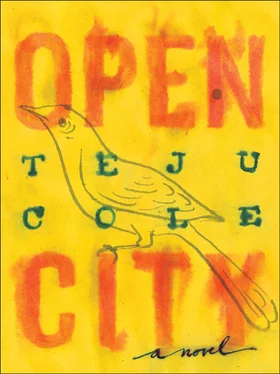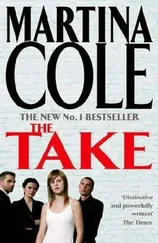They brought me here, he said, and that was the end. I have been here ever since. I have only been outside three times, on the days when I went to court. The lawyer they assigned to me said I might have had a chance before 9/11. But it is okay, I am okay. The food here is bad, it has no taste, but there’s a lot of it. One thing I miss is the taste of groundnut stew. You know it? The other inmates are all right, they are good people. Then, lowering his voice, The guards are sometimes harsh. Sometimes harsh. You can do nothing about it, you learn how to stay out of trouble. I am one of the youngest, you know. Then, raising his voice slightly, They let us exercise, and there is cable television. Sometimes we watch soccer, sometimes basketball; most of us prefer soccer, Italian league, English league.
The security officer had returned, tapping his wristwatch. The visit was over. I raised my hand to the Plexiglas, and Saidu did the same. I don’t want to go back anywhere, he said. I want to stay in this country, I want to be in America and work. I applied for asylum, but it wasn’t given. Now they will return me to my port of entry, which is Lisbon. When I got up to leave, he remained seated, and said, Come back and visit me, if I am not deported.
I said that I would, but never did.
I told the story to Nadège on our way back into Manhattan that day. Perhaps she fell in love with the idea of myself that I presented in that story. I was the listener, the compassionate African who paid attention to the details of someone else’s life and struggle. I had fallen in love with that idea myself.
Later, when our relationship ended, that old cliché had come crashing through: we had “drifted apart.” She had her list of complaints but they seemed petty to me, and there hadn’t been anything in them I was able to make sense of or relate to my life. But I did wonder, in the weeks that followed, whether there was something I had missed, some part of the failure for which I might have held myself responsible.
IN EARLY DECEMBER, I MET A HAITIAN MAN IN THE UNDERGROUND catacombs of Penn Station. I was in the passage along which a long arcade of shops sit with their faces open to the commuters and train departure gates of the Long Island Rail Road. I had stopped in one of the newsagents and bought a guidebook to Brussels, having begun to wonder to myself whether I should spend my vacation time there. I don’t quite know why I paused that afternoon in front of one of the shoeshine shops. I have always had a problem with the shoeshine business, and even on the rare occasions when I wished to have my scuffed shoes cleaned, some egalitarian spirit kept me from doing so; it felt ridiculous to mount the elevated chairs in the shops and have someone kneel before me. It wasn’t, as I often said to myself, the kind of relationship I wanted to have with another person.
But, on this occasion, I stopped and looked into the brightly lit interior which, with all its mirrors and tufted seats upholstered in vinyl, reminded me of an empty barbershop. An elderly black man I hadn’t noticed stood up, waved, and said, Come in, come in, I’ll shine them very well for you. I shook my head quickly, and raised a hand to decline but, not wanting to disappoint him, gave in. I stepped inside and got up on the little stepping stool, and sat in one of the buffoonish red thrones, toward the back of the shop. The air was laced with lemon oil and turpentine. His hair was curly and white, as were his sideburns, and he wore a dirty apron, striped blue and white. It wasn’t easy to guess his age; he was no longer young, but he was sprightly. A bootblack, not a shoeshiner: the older term seemed right for him. He said, You just relax, I’ll make this black as black as night for you. And, with that peculiar sense of metamorphosis one experiences on waking up from an afternoon nap to find that the sun has set, I heard for the first time the faint trace of a Caribbean French accent in his clear, quiet baritone. My name is Pierre, he said. Setting my feet into a pair of brass pedestals, and folding up the cuffs of my trousers, he daubed a rag into the tin of polish in his hand, and began to work the dull color into my shoes. Through the soft shoe leather, I could feel his firm fingers push against my feet.
I haven’t always been a bootblack, you know. That is a sign of changing times. I started out as a hairdresser, and that is what I was for long years in this city. You wouldn’t know it to look at me, but I knew all the fashions of the day, and always styled according to what the ladies required. I came here from Haiti, when things got bad there, when so many people were killed, blacks, whites. The killings were endless, there were bodies in the streets; my cousin, the son of my mother’s sister, and his entire family were slaughtered. We had to leave because the future was uncertain. We would have been targeted, that was almost certain, and who knows what else might have happened. As it got worse, Mr. Bérard’s wife, who had relatives here, said, Enough is enough, we must leave for New York. So that’s how we came here, Mr. Bérard, Mrs. Bérard, my sister Rosalie, me, and there were many others. Rosalie was in the service with me, in the same house.
Pierre paused. Another customer, a balding businessman wearing a too-tight suit, came into the shop and, seemingly out of nowhere, a sullen young man appeared to clean his shoes. The businessman labored for breath. Pierre glanced at his co-worker. He called out, You need to call Rahul about the schedule for next week. I’m off tomorrow, and I can’t do it. Then he rubbed my shoes down with a dry cloth and picked up a foot-long brush.
I learned the trade of hairdressing right here. Our house then was on Mott Street, the area of Mott and Hester. A lot of Irish in the area, Italians, too, later on, and blacks, all working in the service trades. The houses were bigger then and many people needed servants. Yes, some people worked in terrible conditions, I know, inhuman conditions. But it was a question of what family you were with. The loss of Mr. Bérard was like the loss of my own brother. He wouldn’t put it that way, of course, but he taught me to read and write. He was a cold man, at times, but he also had a heart, and I give thanks to God who saved me from any lasting injustice. We heard reports of how bad things were, how many people had been executed by Boukman and his army, and we knew we were fortunate to have escaped. The terror of Bonaparte and the terror of Boukman: there was no difference to those who suffered.
When Mr. Bérard died, I could have walked away, but I had to remain in my work, because Mrs. Bérard needed me. They were higher, we were lower, but in truth it was a family, as the apostle describes God’s family, in which each part plays a role. The head is not greater than the foot. This is the truth. Through the good graces of Mrs. Bérard, I took the trade of hairdressing, as I told you before, and I went into the houses and salons of many notable women in this city, too many to count, and received money for my work. At times, I went up as far as Bronck’s River for work, and no one troubled me. In this way, I earned enough to purchase freedom for my sister Rosalie, and she was shortly afterward married, and blessed with a beautiful daughter. We named her Euphemia. After a while, I had enough money even for my own freedom, but I preferred the freedom within that house and that family to the freedom without. Service to Mrs. Bérard was service to God. My meeting during those years with Juliette, my beloved wife of blessed memory, did not change that. I was willing to be patient. I see from your face that it is hard for you, that it is hard for the young, like you, to understand these things. I was forty-one when Mrs. Bérard died, and I mourned her as I had mourned her husband, and only then did I seek the freedom without.
Читать дальше












